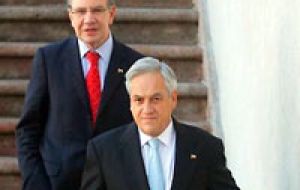MercoPress. South Atlantic News Agency
Piñera to address Chilean students’ demands on Saturday in Government House
 The Chilean president and the Education minister will be at the meeting
The Chilean president and the Education minister will be at the meeting After much deliberation, Chilean Education Minister Felipe Bulnes agreed to meet with student leaders this Saturday, Sept. 3, to discuss their demands. The meeting is to take place in the La Moneda presidential palace, and will be hosted by President Sebastián Piñera himself.
Student leaders had already agreed to meet with the government for roundtable discussions after a brief meeting between both parties last Sunday, but until Bulnes’ announcement, no date had been set in stone.
The meeting will mark an important milestone in the student movement, which has made use of a variety of measures to get the government’s attention. Protests have ranged from mass demonstrations to education-themed flash mobs and kiss-a-thons – one of which is currently scheduled for Thursday.
“This dialogue is a step towards building trust and normalizing the country” said Senate President Guido Girardi “The school takeovers and demonstrations have to end”.
At the meeting, Piñera is expected to tackle a list of 12 points presented by student leaders of the Chilean Student Confederation (Confech) on Aug. 23.
The demands include guaranteeing free education as a constitutional right and improving access to education for low income applicants in the form of grants and scholarships, as well as greater recognition for indigenous student rights and ending municipal oversight of low-performing schools.
The document additionally calls for an end to for-profit educational institutions, a point that ties in to the demand of eliminating the role of private banks in financing tuition loans.
Of the items on the list, the demand to guarantee free education as a right has been deemed to lack any common ground between either party. The same can be said about the end to profiteering in schools.
Technically, earning profit from owning and managing schools is illegal under the Chilean Constitution. The existence of numerous private institutions throughout Chile bears testament to the way this norm has been overlooked.
The awkward legal contradiction has been the reason behind a bill recently introduced by the Piñera administration, which proposes to legalize education as a commodity legitimately bought and sold. For this reason, student leaders have called on the government to freeze deliberations on any bills throughout discussions.
According to El Mercurio, Piñera asked members of his conservative coalition to vote against any bills that call for an end to profit in education.
“While there seems to be a genuine will on behalf of both parties to resolve both conflicts, there are certain visions that are going to make the resolution more difficult,” Andrea Rodriguez, education professor at the Universidad de Santiago, told The Santiago Times on Tuesday. “On behalf of the government, there seems to be more of a focus on short-term conflict resolution.”
According to Rodriguez, this conflicts with the students’ demands that are focused on deeper, long-term changes.
Rodriguez’s assessment is in line with a comment made by Confech spokesperson Camila Vallejo to Chilean daily El Mostrador in mid-August, in which she says that improving the education system is not the objective of the student movement. “We need a new system altogether.”
By Ivan Ebergenyi - The Santiago Times




Top Comments
Disclaimer & comment rules-

-

-

Read all commentsPoor president Piraña :(
Sep 01st, 2011 - 02:03 am 0Hahaha :)
Sep 01st, 2011 - 05:31 am 0OK, the Government want to take the heat out of the protest incrementally; the ‘students’ want a new (social) system. It was ever thus, the whole world over.
Sep 04th, 2011 - 03:17 pm 0(From this article), what, specifically, do the ‘students’ want to be different?
1. ‘Free education’ as a constitutional right.
There is no such thing as ‘free education’; the people pay; the tax-payers. Many more people will need to become tax-payers and pay higher taxes to meet this demand.
2. Improving access to education for low-income applicants; grants and scholarships.
Good in itself, but many more people will need to become tax-payers and pay higher taxes to meet this demand.
3. Greater recognition for the rights of indigenous students.
Good in itself, but are we talking about people with Chilean nationality, or the ‘native Chilean’ community? Do the two groups have different rights?
4. Ending municipal oversight of low-performing schools.
If not the municipal authorities, who should have oversight of performance? The State Ministry of Education? The ‘students’ themselves?
5. An end to ‘for-profit’ educational institutions.
‘Profiteering in schools’ = private schooling, includes religious schools/international schools/foreign & overseas colleges/etc. If corruption is the issue, end corruption; do not deny ‘private’ enterprise the right to educate certain of the nation’s children.
6. Stopping private banks financing tuition loans.
There is nothing intrinsically wrong with any bank being used as the Loan Company; all that is needed is good and honest oversight.
There is no ‘Crunch issue’ here;
all is soluble, except the right to be educated outside the state system.
But the nation will need to be educated through the media that this 'new world of education' comes at a significant cost,
and it is them, through more and heavier taxes, that will be bearing this cost.
They may choose to do so, and this could become the key ballot box issue.
Commenting for this story is now closed.
If you have a Facebook account, become a fan and comment on our Facebook Page!